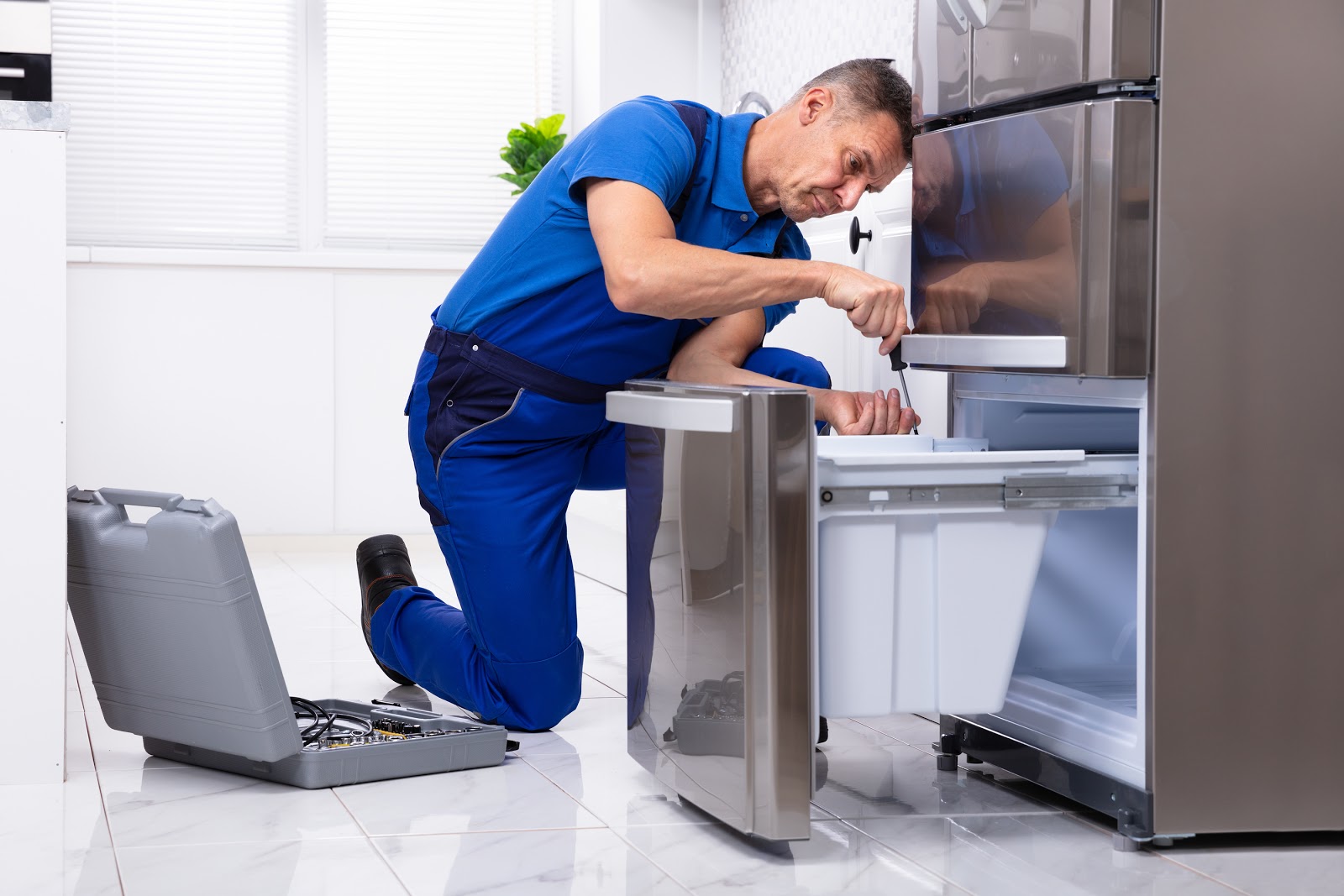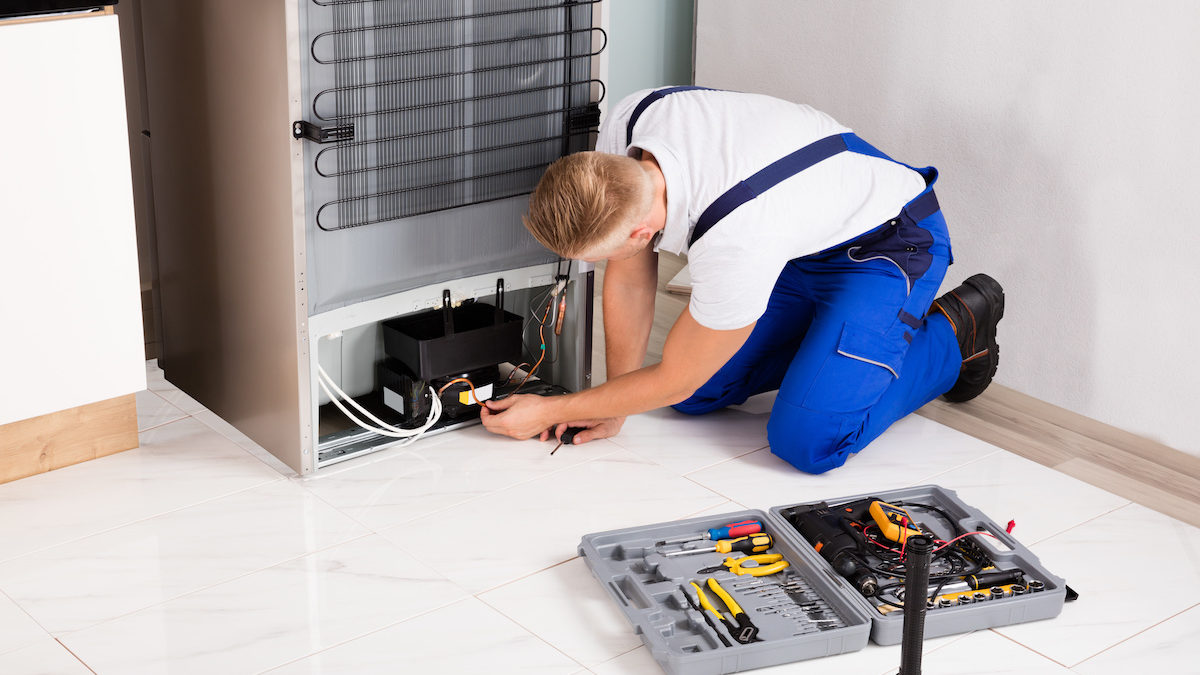Avoid Appliance Disasters with GE appliance repair Oro Valley Dependable Refrigeration & Appliance Repair Service's Safety Tips
Avoid Appliance Disasters with GE appliance repair Oro Valley Dependable Refrigeration & Appliance Repair Service's Safety Tips
Blog Article
Important Tips for Effective Ref Repair Service to Prolong Appliance Lifespan
When it comes to your fridge, appropriate repair and maintenance are important for long life. Comprehending common problems and knowing when to act can make all the distinction.
Comprehending Common Refrigerator Problems
Fridges are crucial in maintaining your food fresh, yet they can experience a range of usual troubles that disrupt their performance. One constant problem is inadequate cooling. If you see food spoiling quicker than common, check the thermostat setups or take into consideration if the door seals are damaged. One more common issue is extreme sound, which could indicate a malfunctioning compressor or a failing follower. You could also experience water pooling inside or below the refrigerator; this commonly results from a clogged defrost drainpipe or a malfunctioning water line. Furthermore, if your fridge's light isn't functioning, maybe a simple bulb problem or a problem with the door switch. Ice build-up in the fridge freezer can hinder air movement and cooling down efficiency. Recognizing these issues early can conserve you time and cash out of commission, guaranteeing your fridge runs smoothly and successfully.
Routine Maintenance Practices
To maintain your home appliances running efficiently, you require to remain on top of regular maintenance practices. Clean the condenser coils, check the door seals, and keep track of the temperature level settings to ensure peak efficiency. These easy jobs can save you money and time on repair work down the line.
Tidy Condenser Coils Routinely
Cleansing your condenser coils routinely can considerably boost your appliance's performance. Dust and dirt accumulate on these coils gradually, causing your appliance to work more difficult and take in even more energy. To keep them tidy, disconnect your device and meticulously get rid of any kind of safety covers. Use a vacuum with a brush accessory or a soft brush to carefully remove debris. If required, a combination of warm water and moderate cleaning agent can aid remove persistent crud. Ensure to allow whatever completely dry entirely prior to rebuilding and plugging the home appliance back in. Aim to cleanse your coils at least two times a year, or more frequently if you have pet dogs or stay in a dirty atmosphere. This easy job can expand the life-span of your home appliance considerably.
Check Door Seals
Three basic steps can aid you ensure your device's door seals are in great condition. Check the seals routinely for any cracks, splits, or signs of wear. These problems can cause air leaks, affecting performance. 2nd, tidy the seals using cozy, soapy water to get rid of any type of debris or grime. A clean seal assures a tight fit and far better efficiency. Carry out a straightforward examination by closing the door on a piece of paper. If you can easily pull it out without resistance, the seal may require changing. By adhering to these steps, you'll preserve your appliance's performance and longevity, saving you cash on energy bills and repair work over time.
Screen Temperature Level Setups
On a regular basis monitoring your device's temperature level setups is important for best performance and effectiveness. Whether you're taking care of a refrigerator, fridge freezer, or stove, watching on these settings can avoid lots of concerns. For fridges, go for temperatures in between 35 ° F and 38 ° F; for fridges freezer, remain 0 ° F. If the temperatures are too expensive or low, your device might function harder, throwing away power and shortening its life-span. Make use of a thermostat to inspect these setups frequently, especially after significant changes, like relocating your device or changing the thermostat. If you observe changes, adjust the settings accordingly and get in touch with the user handbook for guidance. By staying aggressive about temperature level tracking, you'll assure your appliances run efficiently and last longer.
Troubleshooting Cooling Concerns
When your fridge isn't cooling down properly, it can lead to ruined food and lost cash, so dealing with the issue promptly is critical. Beginning by inspecting the temperature level settings to verify they're at the recommended levels, generally around 37 ° F for the refrigerator and 0 ° F for the freezer. If the setups are proper, inspect the door seals for any type of gaps or damages; a defective seal can allow warm air to get in.
Next, analyze the vents inside the fridge and fridge freezer. Confirm they're not obstructed by food items, as this can disrupt air flow. Listen for the compressor; if it's not running or making unusual sounds, it might need attention. Examine the condenser coils, typically situated at the back or bottom of the device. Dust and debris can build up, causing cooling down issues. Clean them with a vacuum cleaner or brush to enhance performance. If issues continue, it may be time to call an expert.
Taking Care Of Water Leakage and Ice Accumulation
If you're handling water leakage or ice accumulation in your home appliance, it's important to recognize the source of the trouble. By determining where the water is coming from, you can protect against additional concerns and avoid costly repair services. Let's check out some efficient strategies to take on these usual problems.
Determine Leak Sources
Just how can you successfully determine the resources of water leakage and ice accumulation in your devices? Start by checking the seals and gaskets on your fridge and fridge freezer doors. A worn or damaged seal can enable cozy air to go into, causing condensation and ice. Next off, inspect the drain pan and drain system for clogs or blockages; a backed-up drain can bring whirlpool oven repair service near me about water pooling. Seek any kind of loosened links in the water line, which can create leaks. Examine the defrost drain for ice accumulation, which might interrupt appropriate drain. By systematically checking these locations, you'll pinpoint the resource of the issue, enabling you to take the essential actions to fix it and extend your home appliance's life-span.
Prevent Ice Development
To avoid ice development in your appliances, start by verifying the temperature level settings are appropriate. If your fridge or fridge freezer is as well chilly, it can bring about excessive ice accumulation. Examine the door seals on a regular basis; damaged seals can allow warm air in, triggering condensation and ice development.
Keep the device well-ventilated and avoid overcrowding, as this can obstruct air movement - Refrigerator repair experts Dependable Refrigeration & Appliance Repair. Additionally, regularly defrost your freezer if it does not have an automated defrost feature.
If you discover water leakage, determine and take care of any blocked water drainage holes, as they can add to ice build-up. Clean the coils and validate they're functioning appropriately to keep peak efficiency. Taking these steps will assist prolong your appliance's lifespan and performance.
Attending To Noisy Fridge Appears
While it might appear startling, a loud refrigerator commonly signifies small issues instead than significant breakdowns. Typical culprits include the compressor, fans, and water lines.
Next, look for loosened products inside. Sometimes, containers or shelves can rattle, creating unwanted noise. Tighten or reposition them to get rid of the sounds.
If you observe a clicking noise, it could be the defrost timer. This is generally harmless however might indicate it requires assessment.
Finally, verify your refrigerator is level. An out of balance device can generate vibrations and sound. Utilize a degree to examine, and change the feet if required. Resolving these concerns without delay can help maintain your refrigerator's efficiency and prolong its life-span.
When to Change Parts vs. Full Replacement

Consider the cost of fixings versus the home appliance's worth. Furthermore, if you observe continuous issues that maintain persisting, it's a sign that your appliance has actually gotten to the end of its life.
Understanding When to Call a Specialist
How can you tell when it's time to call in a specialist for home appliance repair work? If you see unusual sounds, smells, or leakages, it's a clear signal that something's incorrect. Don't neglect these signs; they often show much deeper concerns. If your device quits working completely or frequently trips breaker, it's an additional red flag.
You need to additionally consider your very own convenience degree with repair work. If you're uncertain regarding diagnosing the trouble or do not have the right devices, it's best to connect for assistance. Bear in mind, attempting difficult repair work can result in more damages and even safety and security threats.

Regularly Asked Inquiries
Just how Typically Should I Clean the Refrigerator Coils?
You ought to cleanse your refrigerator coils every 6 months. This assists preserve performance and stops other overheating. If you observe extreme dirt or pet hair, tidy them a lot more regularly to guarantee your refrigerator runs smoothly.

Can I Utilize Vinegar for Cleansing My Fridge?
Yes, you can utilize vinegar to clean your refrigerator! It's an exceptional all-natural cleanser that removes smells and spots. Best Appliance Repair Near You Dependable Refrigeration & Appliance Repair Service. Just blend it with water, apply it to surface areas, and wipe down for a fresh, tidy fridge
What Temperature Should My Refrigerator Be Ready To?
You must establish your fridge to 37 ° F(3 ° C) for excellent food preservation. This temperature keeps your food fresh while preventing wasting, guaranteeing your groceries last much longer and decreasing waste. It's a simple adjustment you can make!
Does a Fridge Required to Be Leveled?
Yes, your refrigerator needs to be leveled. If it's irregular, it can affect cooling down effectiveness and cause excess noise. Examine the progressing legs and adjust them to ensure appropriate equilibrium for excellent performance.
Exactly How Can I Reduce Refrigerator Energy Intake?
To minimize your refrigerator's power consumption, keep it tidy and well-ventilated, inspect door seals for leakages, set the temperature level between 35-38 ° F, and prevent overwhelming it. These actions can considerably reduce your energy expenses.
Report this page